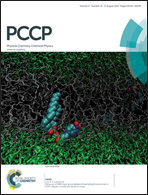Tunable dipole induced hydrogen bonds between a hydrogen molecule and alkali halides
Abstract
Hydrogen bonding (HB) systems are known to be X–H⋯Y type complexes, which are called conventional HB systems if the X and Y are strongly electronegative atoms such as O, N and halides or unconventional systems if the X is replaced by C. In this study, we devise a new dipole-induced HB that is formed between a hydrogen molecule and an alkali halide using ab initio calculations. The HB is depicted as H–H⋯Y–M, in which MY are alkali halides. Analysis of the possible structures and properties of the proposed compounds, including their geometries, frequencies, bond strength, and natural charge distribution, as well as a topological analysis of electronic density, shows that the large dipole moment of the Y–M molecule is responsible for the generation of the proposed HB. We also find that the strength of HB can be tuned by adopting MY with various polarities. We hope that our findings could provide a new insight into HB.



 Please wait while we load your content...
Please wait while we load your content...